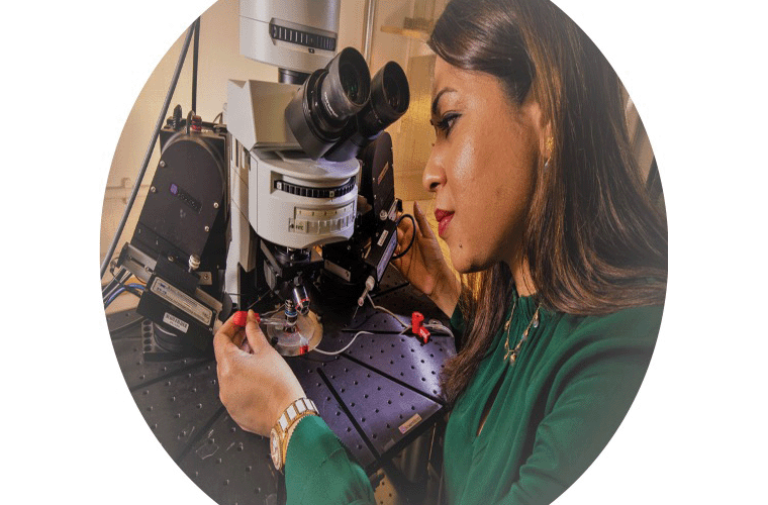Meet the Expert: Professor Afia Ali
4 December 2023
Prof Afia B Ali is a Professor of Neuroscience in the Department of Pharmacology at the UCL School of Pharmacy, where she has been since 2005. Her research portfolio covers multi-disciplinary projects spanning neurological disorders from epilepsy to Alzheimer’s disease.

Your current research is on synaptic behaviour in health and dysfunction in neural circuits. How did you get into this field?
I made a significant contribution to the cellular neuroscience field by deciphering the different languages between neuronal circuits that advanced our understanding of synaptic physiology and pharmacology of the mammalian brain using unique experimental skills in electrophysiology that I refined. I lent this expertise to a therapeutic setting by strategically entering the dementia field in 2016. Little was known about neural circuit changes during AD progression, therefore, I led projects to fill these missing gaps in the field.
More recently, my lab is focused on mental health associated with Alzheimer’s disease and is focused on preclinical studies that will help develop medicines to alleviate memory deficits and anxiety.
What are some of the causes of synaptic dysfunction in the brain, and how do these disruptions affect cognitive function and behaviour?
Here are some of our key recent findings:
- the early stage changes in synaptic proteins and communication in AD, advancing our understanding of how the disease spreads to sub-brain regions (Petrache et al., 2019). This work was selected as a symposium at this year's largest international, Society for Neuroscience conference, validating its impact, with a trajectory of fostering global collaborations, including a secured book deal with Elsevier;
- discovered which neurons survive and which neurons degenerate in AD, namely interneurons and the synaptic/ extra-synaptic GABA(A) receptors (Petrache et al., 2020; Shi et al., 2019). These findings have provided novel insight that will lead to future strategic grant applications for the development of therapies to alleviate memory deficits and neuropsychiatric symptoms in AD.
- changes in the supporting, astrocytes/glial cells and their receptors, such as the purinergic P2Y1 and GABA transporters that are important for neuroinflammation (Aldabbagh et al., 2022), which resulted in the major investment into developing therapy focused on P2Y1 receptors at UCL DDI.
- preservation of specific brain regions (Islam et al., 2022) and alteration of the perineuronal nets of the brain (Ali et al., 2022), which demonstrated for the first time the anatomical and biophysical interconnections of preserved brain regions in AD, this has provided the basis for future UKRI funding aimed at preventing the early-stage spread of AD symptoms.
Are there any strategies or interventions that have been successful in treating or preventing synaptic dysfunction?
We have a few projects underway to answer this question which involves gene therapy and recent funding awarded fom ARUK to develop a novel human model of dementia (iPSC cells).
You’ve taken part in Dementia Friends training. Tell us a bit more about this and what we can do to join in.
I have continually led public events to promote science education and brain health, given public seminars on dementia awareness as part of the Alzheimer Society Dementia Friend Scheme, and have fundraised for dementia research engaging with key public stakeholders, with the most recent event held at the School of Pharmacy in May 2022, “Art for Dementia Research”, attracting more than 100 participants and raising more than £5000.
What inspired you to become a neuroscientist?
My motivation is to make a significant change in research and a breakthrough in understanding the pathology of Alzheimer’s disease mechanisms and to potentially bring a drug to clinic to alleviate the symptoms of memory loss but also mental health linked with Alzheimer’s disease.
You’ve been heavily involved in helping UCL to look at the BAME Awarding Gap. Do you feel we have made sufficient progress, and what do you see as our challenges in this regard post-pandemic?
I think we have made progress over that last few years at FLS by reducing the awarding gap, which is due to collective efforts from the teaching teams across various departments. However, we still have work to do in creating an environment where our students have a better sense of belong to the institution at UCL and continue to influence curriculum design to reflect inclusion and diversity in all departments across FLS.
Which research projects/areas will you be involved in over the next few years?
I want to address the key issues that could be contributing to the awarding gap across faculties which needs to be addressed include:
- Lack of diversity and representation in the curriculum;
- Lack of student belonging within institutions and feeling isolated;
- Lack of a strategy to address the underlying issues;
- Implicit/ unconscious bias;
- Racism in the form of institutional racism, discrimination and microaggressions from staff and students;
Lack of staff diversity and limited role models, particularly leadership positions held by BAME staff.
Further Information:
Follow Dr. Afia Ali on Twitter
 Close
Close

